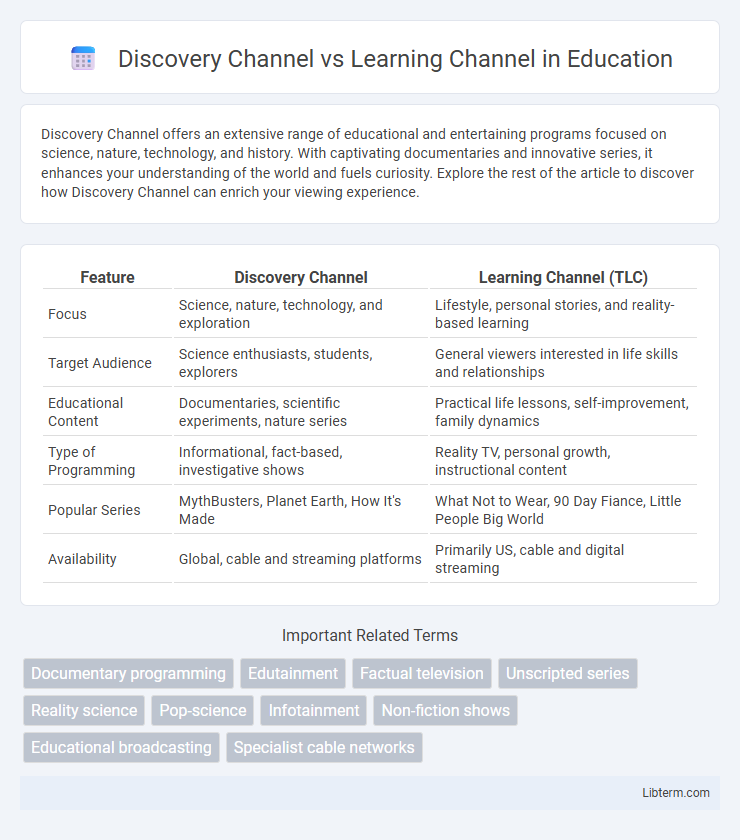Discovery Channel offers an extensive range of educational and entertaining programs focused on science, nature, technology, and history. With captivating documentaries and innovative series, it enhances your understanding of the world and fuels curiosity. Explore the rest of the article to discover how Discovery Channel can enrich your viewing experience.
Table of Comparison
| Feature | Discovery Channel | Learning Channel (TLC) |
|---|---|---|
| Focus | Science, nature, technology, and exploration | Lifestyle, personal stories, and reality-based learning |
| Target Audience | Science enthusiasts, students, explorers | General viewers interested in life skills and relationships |
| Educational Content | Documentaries, scientific experiments, nature series | Practical life lessons, self-improvement, family dynamics |
| Type of Programming | Informational, fact-based, investigative shows | Reality TV, personal growth, instructional content |
| Popular Series | MythBusters, Planet Earth, How It's Made | What Not to Wear, 90 Day Fiance, Little People Big World |
| Availability | Global, cable and streaming platforms | Primarily US, cable and digital streaming |
Overview of Discovery Channel and Learning Channel
Discovery Channel delivers a vast array of high-quality documentary-style programming focused on science, technology, nature, and exploration, catering to viewers interested in real-world knowledge and adventurous storytelling. The Learning Channel (TLC) initially concentrated on educational content related to science and personal development but has evolved to emphasize lifestyle, reality-based series, and family-oriented programming. Both channels originated with educational missions, yet Discovery Channel remains more dedicated to factual content, whereas TLC targets a broader audience with a mix of informative and entertainment-driven shows.
Historical Background and Evolution
Discovery Channel, launched in 1985, originally focused on documentary-style content covering science, technology, and history, quickly becoming a pioneer in educational entertainment. The Learning Channel (TLC), which began in 1972 as the Appalachian Educational Satellite Project before rebranding, shifted from purely educational programming to reality-based and lifestyle content over time. Both channels evolved to balance engaging programming with informative content, reflecting changes in audience preferences and media consumption trends.
Programming Focus and Content Types
Discovery Channel specializes in documentary-style programming with a strong emphasis on science, technology, exploration, and adventure, featuring series like "MythBusters" and "Deadliest Catch." Learning Channel (TLC) centers on lifestyle, personal stories, and reality-based content, including shows such as "90 Day Fiance" and "Dr. Pimple Popper." Discovery Channel targets audiences interested in factual and educational content, while TLC appeals to viewers seeking entertainment through family, relationships, and human-interest stories.
Target Audience Comparison
Discovery Channel targets a broad audience interested in science, technology, adventure, and exploration with a focus on factual documentaries and reality programming. Learning Channel (TLC) appeals primarily to viewers interested in lifestyle, personal stories, and family-oriented content, emphasizing reality TV centered around relationships, health, and home improvement. Both networks cater to different age demographics and viewing preferences, with Discovery Channel attracting more male viewers aged 18-49 and TLC resonating more with female viewers aged 25-54.
Notable Shows and Series
Discovery Channel features notable shows such as "MythBusters," "Deadliest Catch," and "Shark Week," emphasizing science, adventure, and nature documentaries. Learning Channel (TLC) is known for series like "90 Day Fiance," "Say Yes to the Dress," and "Dr. Pimple Popper," focusing on reality TV and personal stories. Both networks cater to different audiences with Discovery Channel prioritizing educational content and TLC highlighting lifestyle and entertainment programs.
Educational Value and Impact
Discovery Channel offers a broad range of science, history, and nature documentaries that provide in-depth educational content for diverse audiences. Learning Channel (TLC) primarily focuses on lifestyle, family, and personal transformation programming, delivering more practical and relatable educational value. Both channels impact viewers by expanding knowledge, but Discovery Channel emphasizes academic learning while TLC emphasizes real-life experiences and personal growth.
Entertainment vs Informational Approach
Discovery Channel emphasizes entertainment through high-adrenaline documentaries, reality shows, and visually captivating content aimed at engaging viewers emotionally. Learning Channel (TLC) prioritizes an informational approach by offering lifestyle, family, and personal stories that provide educational value grounded in real-life experiences. Both networks balance entertainment and education but Discovery leans toward thrill and adventure, while TLC focuses on relatable, knowledge-based storytelling.
Brand and Global Reach
Discovery Channel, known for its engaging documentaries and factual entertainment, has established a strong global presence in over 220 countries, attracting millions of viewers with content focused on science, technology, and exploration. Learning Channel (TLC) emphasizes lifestyle, reality, and personal stories, reaching audiences worldwide with localized versions in more than 175 countries, catering to diverse cultural interests. Both brands leverage extensive distribution networks and digital platforms to maximize global reach and audience engagement across multiple demographics.
Viewer Ratings and Popularity
Discovery Channel consistently outperforms Learning Channel in viewer ratings, attracting a broader audience with its diverse programming, including documentaries on science, technology, and adventure. Learning Channel, while popular for its lifestyle and reality-based content, maintains a niche viewership primarily interested in family and personal development themes. Viewer ratings data from Nielsen indicates Discovery Channel holds a higher market share, reflecting greater overall popularity and engagement across key demographic groups.
Pros, Cons, and Final Verdict
Discovery Channel offers extensive documentaries on science, nature, and technology, providing in-depth educational content with high production quality, but it can sometimes lean towards sensationalism. Learning Channel (TLC) focuses more on lifestyle, reality, and personal stories, making it relatable and engaging, though it may lack rigorous educational depth. For viewers seeking comprehensive factual programming, Discovery Channel is the better choice, while those interested in human-interest stories and entertainment may prefer TLC.
Discovery Channel Infographic

 libterm.com
libterm.com